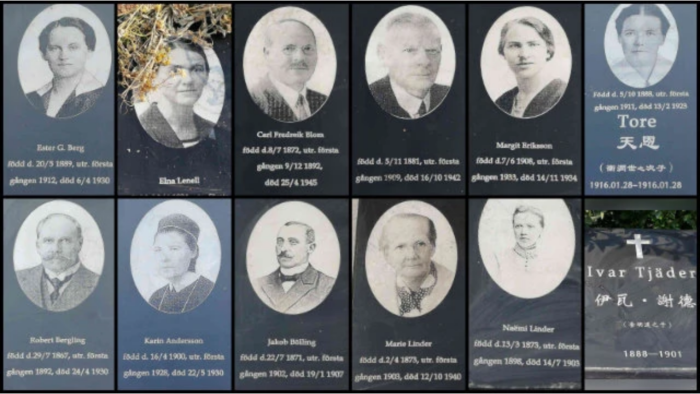China bulldozes 'illegal' gravestones of 20 Swedish missionaries

Chinese authorities ordered the demolition of gravestones of Swedish missionaries credited with converting thousands of Chinese citizens to Christianity nearly a century ago.
Claiming the structures were "illegal," over 100 special police and public security officers and personnel from various government institutions blocked Xiezhou cemetery located in the Yanhu district of Yuncheng on Sept. 12, according to Bitter Winter, an online magazine that focuses on religious freedom and human rights in China.
A short time later, three excavators were brought in to destroy the gravestones of 20 Swedish missionaries buried in the cemetery, along with the adjoining guest house, designating it, too, as an “illegal construction.” During the demolition, aerial drones flew overhead and monitored the destruction.
To conceal the demolition, government-hired personnel planted vegetation atop the ruins overnight. A government insider told Bitter Winter that all villagers living near the cemetery were summoned to the local police station prior to the demolition, and their cellphones were confiscated to prevent information leaks.
The demolished gravestones were established in 2008 by the Church of Christ’s Family, a local house church established in 2008 to honor missionaries with the Swedish Mission in China, including Verner Wester, who lived in China from 1903 to 1930, and his six family members.
The missionaries served in Yuncheng before expanding to other areas in Shanxi and adjoining provinces of Henan and Shaanxi. Verner, along with the other missionaries, helped build 60 churches with over 6,000 members. They also established Yucheng Hospital, which residents could use for free. The hospital is credited with saving thousands of lives.
The Swedish missionaries “played an important role in the areas’ development and led numerous locals to Christianity,” notes Bitter Winter.
In addition to establishing gravestones for the missionaries in the Xiezhou cemetery, the church contacted Wester’s family and renovated an old four-room house near the cemetery to accommodate visitors who came to pay respects to the missionaries and pray. The house also displayed a series of photographs depicting the missionaries’ work in China.
Following the demolition, the Church of Christ’s Family was blacklisted by the government and targeted for priority surveillance because of contacts with Verner Wester’s family in Sweden.
A member of the Church of Christ’s Family told Bitter Winter that the Chinese Communist Party often portrays missionaries in a negative light, depicting them in films and novels “as spies cooperating with imperialist countries to invade China.”
“Believers renovated the cemetery to show their positive influence, but the CCP can’t tolerate that the missionaries’ Christian spirit will spread across China,” the Christian said. “Missionaries’ gravestones can be demolished, but their spirit has been deeply rooted in our hearts and inspired generations of believers.”
The CCP’s destruction of Christian structures and symbols — including church buildings, crosses, and even pictures of Jesus Christ — indicates it feels “threatened” by the rapid spread of Christianity in the country, experts say.
According to estimates, there are about 116 million Protestant Christians in mainland China, compared to 90 million members in the officially atheist Communist Party.
The CCP’s campaign to bring all religions under its control is not isolated to Christianity. Other religious minority groups — including Tibetan Buddhists, Falun Gong and Uighur Muslims — have also experienced increased surveillance and persecution in recent years.
A 2019 AFP investigation found that authorities in Xinjiang, in China’s northwest, had destroyed burial grounds where generations of Uygur families were buried. The AFP, which visited 13 destroyed cemeteries across four cities and saw bones in at least three sites, estimated the CCP had destroyed at least 45 Uygur cemeteries since 2014.
China has also been labeled by the U.S. State Department as a “country of particular concern” for “continuing to engage in particularly severe violations of religious freedom.




























